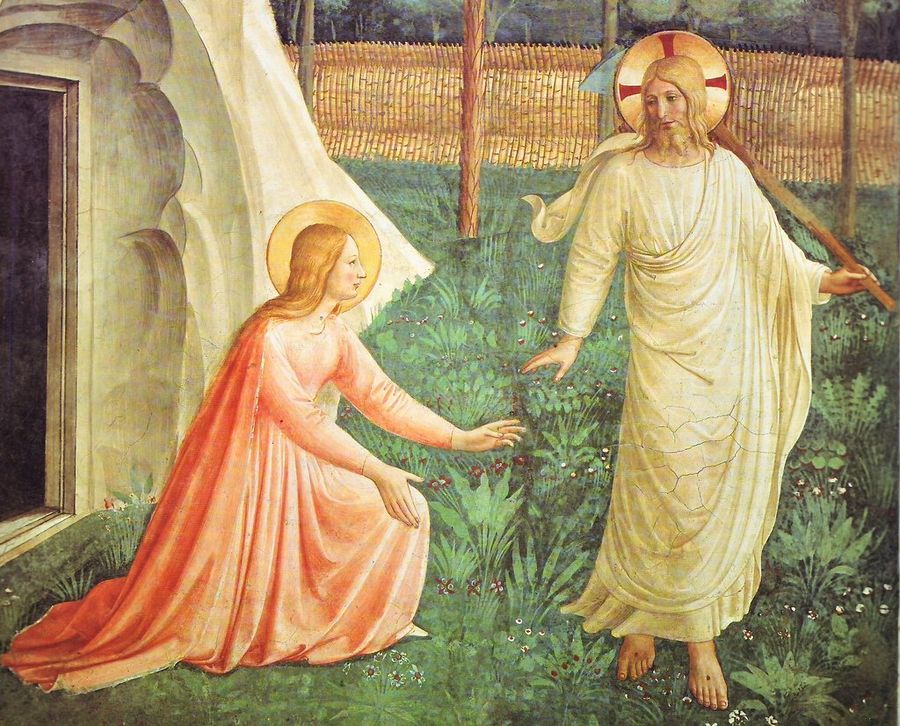Message of Abbot Paul - Easter Tuesday
Message from Fr Paul for Tuesday, 6th April 2021
I feel sure that all those living in England were pleased to hear the Prime Minister confirm yesterday afternoon that the government’s roadmap out of lockdown is going to plan, while at the same time advising caution and more of that disciplined spirit that have brought us through to the present moment. Places of worship also come within the roadmap, so we hope that gradually it will be possible to open up to a more natural celebration of the Liturgy. Nevertheless, I must say how spiritually uplifting the celebration of Holy Week and Easter Day has been this year and how much I have enjoyed, if that’s the right word, our parish liturgies. They were peaceful and prayerful, a truly contemplative experience. I particularly wish to thank our stewards who made this possible; may God reward you.
The Gospel passage for today, Easter Tuesday, is the continuation of Sunday’s Gospel and comes from. John, (Jn 20: 11-18), the encounter of Mary Magdalene with the risen Christ. “Mary stayed outside near the tomb, weeping. Then, still weeping, she stooped to look inside, and saw two angels in white sitting where the body of Jesus had been, one at the head, the other at the feet. They said, ‘Woman, why are you weeping?’ ‘They have taken my Lord away’ she replied ‘and I don’t know where they have put him.’” It’s the third day since Jesus was crucified and buried in the tomb and Mary is outside weeping. She is still weeping when she stoops to look inside, where two angels, rather than one, ask her why is she weeping. She replies using the exact words she had spoken to Peter and the beloved disciple earlier that morning. She is convinced that Jesus, whom she calls “my Lord” has been taken away. Before waiting for an answer, she turns round and sees Jesus standing there. He speaks to her, using the same words as the angels, “Woman, why are you weeping? Who are you looking for?” The only other person in John’s Gospel whom Jesus refers to as “woman” is Mary, his mother, addressing her at the wedding feast of Cana and again when hanging on the cross. But Mary Magdalene does not recognise him. How do you not recognise a person you love? Was it her tears or perhaps he looked different? Then again, she just didn’t expect him to be alive.
“Supposing him to be the gardener, she said, ‘Sir, if you have taken him away, tell me where you have put him, and I will go and remove him.’ Jesus said, ‘Mary!’ She knew him then and said to him in Hebrew, ‘Rabbuni!’ – which means Master.” John’s ironic way of recounting this event cannot escape us: Mary thinks she is speaking with the gardener and even accuses him of having removed the body of Jesus from the tomb. It’s only when he speaks her name that she recognises him, calling him Rabbuni. So important is this moment that John gives the actual Hebrew word she used before giving us the Greek translation. This moment cannot last; she must not cling to him but think ahead. He says to her, “Do not cling to me, because I have not yet ascended to the Father. But go and find the brothers, and tell them: I am ascending to my Father and your Father, to my God and your God.” Jesus is risen from the dead but still has to ascend to the Father, so Mary is given the message she must take to the community, his disciples, that there is no time to lose. Thus, Mary of Magdala becomes the Apostle of the Apostles, the first to see Jesus risen from the dead, the first to speak with him and hear his voice, the first to be given a mission. “So Mary of Magdala went and told the disciples that she had seen the Lord and that he had said these things to her.”
Lord, we thank you today for Mary Magdalene, your Apostle, faithful to the end, so that she might be the first to witness a new beginning. Help us to emulate her friendship and loving devotion and so be rewarded with the gift of eternal life. Like her, may we share our faith with others and so be filled with the joy of the Resurrection. Amen.










